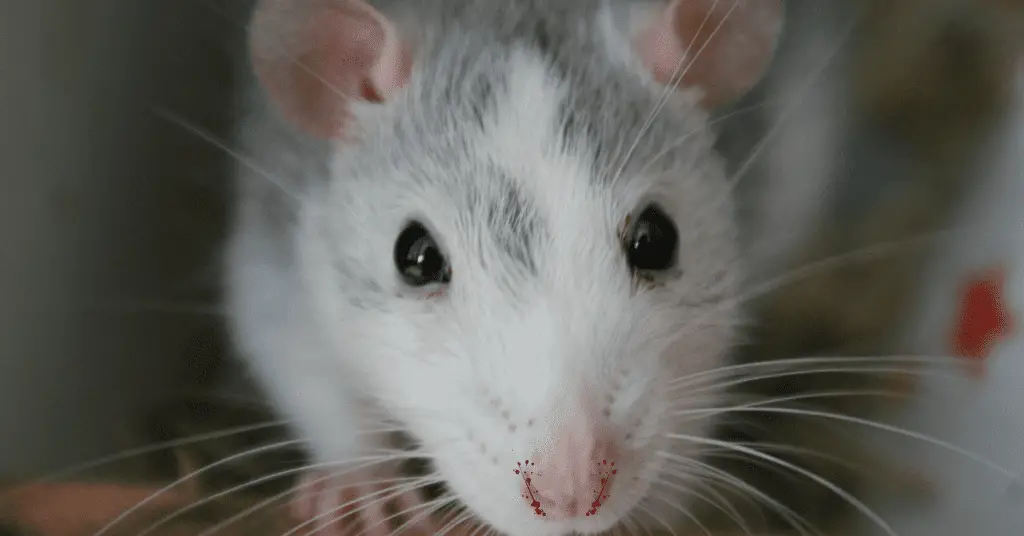You woke up one morning to check on your rat and you noticed his nose is bleeding. That can happen for a variety of reasons which we will discuss in this article.
This article will also touch on pseudo nose bleeding, where your rat’s nose just looks like it’s bleeding but is in fact completely normal.

So, Why is my rat’s nose bleeding and why do rats sneeze blood?
If your rat’s nose is bleeding, it’s important to get to the bottom of the cause as soon as possible. Although a bloody nose can be alarming, it’s not always indicative of a serious underlying condition.
In some cases, a bloody nose may be caused by something as simple as a minor injury. However, if the bleeding is continuous or heavy, it could be a sign of something more serious, such as an infection or a tumor.
If your rat’s nose is bleeding heavily, take them to the vet for an evaluation so that the cause can be diagnosed and treated accordingly.
Not all bleeding is real blood.
If you’ve ever noticed your rat’s eyes looking red and watery, or if you’ve discovered a small pool of blood by their nose, or your rat’s sneezing “blood” you may be worried, but there’s a good chance it’s not really blood!
It’s likely that your rat is suffering from a condition called lacrimation, which is the medical term for excessive eye discharge.
Rats have a gland in their body that produces a reddish-brown tint to their tears and mucus that can often look like blood, but it’s completely normal.
This discharge is actually produced by special glands located in the eyes, and it helps to keep the eyes lubricated and free of debris.
In most cases, lacrimation is nothing to worry about and is normal in rats, however, it increases in severity as a rat becomes stressed, and may be an indicator something else is wrong.
If the discharge is accompanied by other symptoms such as sneezing, runny nose, or difficulty breathing, it’s important to seek veterinary care as these can be indicative of a larger problem.

How do you know if your rat’s nose is bleeding or not?
If you notice your rat’s nose is wet and red, it could be because of lacrimation. This is when the blood vessels in the nose dilate and leak fluid. It’s not actually blood, but it can look like it.
If you’re not sure if your rat’s nose is bleeding or not, the best way to check is by lightly pressing a tissue against their nostrils. If the tissue turns red, it’s most likely just lacrimation.
However, if the tissue turns brown or black, it’s likely that your rat is actually bleeding.
During a nosebleed, your rat may also experience difficulty breathing, so it’s important to get them help as soon as possible.
Real nosebleeds often are accompanied by sneezing, difficulty breathing, wheezing, or large amounts of blood.
If your rat is experiencing any of these symptoms as well as profuse bleeding, you need to take them to the vet immediately to get checked.

What are some common conditions that can cause a rat’s nose to bleed?
A rat’s nose may bleed for a variety of reasons, including trauma, infection, tumors, and blood disorders. Trauma is the most common cause of nosebleeds in rats, and it can occur if the rat is hit by a falling object or stepped on.
Infections of the nose or sinuses are another common cause of nosebleeds, and they can be treated with antibiotics.
Tumors of the nose or sinuses are relatively rare in rats, but they can occasionally cause bleeding. Blood disorders are also relatively rare in rats, but they can sometimes cause nosebleeds.
If your rat is suffering from chronic nosebleeds, or they happen more often than they should, it is important to take it to the vet for an examination.

What should you do if your rat’s nose starts bleeding?
If you notice your rat’s nose is bleeding, it’s important to take action quickly. Most rats are very good at self-grooming and keeping their noses clean, so bloody noses can be a sign of an underlying health condition.
The first step is to try to determine the cause of the bleeding. If your rat has been scratching or rubbing its nose, it could be a sign of allergies or other irritation.
If your rat has been exposed to any toxic substances, such as cleaning products or cigarette smoke, this could also be the cause.
Check his cage for anything he could have run into, smashed up against, or poked his nose with. Physically inspect his nose for any lacerations, scabbing, or lesions.
If you can’t determine the cause, it’s best to take your rat to the vet for a check-up. The vet will be able to run tests and determine if there is an underlying health condition that is causing the nosebleeds.
In most cases, nosebleeds are nothing to worry about and will clear up on their own. However, if they are accompanied by other symptoms or happen more often than they should, it’s important to take your rat to the vet for a check-up.

How can you prevent your rat’s nose from bleeding in the first place?
One of the best ways to prevent your rat’s nose from bleeding is to schedule regular checkups with a vet. This will help to catch any problems early on and provide treatment before the condition worsens.
Additionally, it is important to avoid using any damaging chemicals in the rat’s cage, as this can irritate the delicate mucous membranes and lead to bleeding.
Finally, be sure to keep any pointy objects out of the rat’s cage, as these can cause injury if rubbed against the nose. By taking these simple precautions, you can help to keep your rat’s nose healthy and free from bleeds.

Why are my rat’s eyes bleeding?
If you notice your rat’s eyes are bleeding, it is most likely due to tears. When rats experience stress, they produce more tears than usual, which can sometimes look like their eyes are bleeding.
However, this is usually not a cause for concern and will not require treatment. If you are worried about your rat’s health, you can speak to a veterinarian to get peace of mind.
In the meantime, try to reduce your rat’s stress levels by providing them with plenty of toys and hiding places. By reducing their stress, you will help lower the amount of redish tears produced.
Rats are highly social creatures and get depressed very quickly without regular handling and contact with their humans and other rats. It’s important they get all the social interaction they need to stay happy and healthy.



